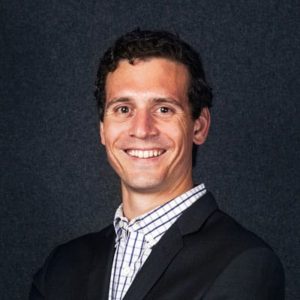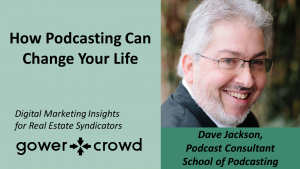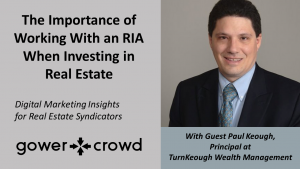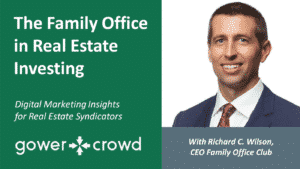FREE TRAINING
What is Real Estate Crowdfunding?
Learn how to build wealth and earn passive income in real estate while someone else does all the work.
233 Matt Rodak, Founder and CEO, Fund That Flip

Matt Rodak, Founder & CEO Fund That Flip
I'm originally from the Canton Cleveland Ohio area. I got started in my entrepreneurial journey when I started a landscaping company in high school and ended up doing a lot of a lot of work for real estate investors and people that were primarily either flipping houses or buying rental properties and fixing them up and then sending them out. These guys would hire me to come in to not only do landscaping but occasionally hire my truck and trailer, and three or four buddies from a football team would come in and also help with the demo of the houses.

How It All Started
It was not a great time to get into the business with college tuition bills to pay so I took a job with a large commercial property insurance and risk management company that insured about a third of the Fortune 500 companies and Global 500 companies and worked my way up through the ranks to the point where I was running sales and marketing for their middle market group which is about a $900 million company.
I got a lot of great exposure to business and was involved as a subject matter expert on technology development and helped rehang our sales processes and marketing processes and alignment and CRM systems, working on a lot of really cool strategic projects. I had a lot of exposure as well to the executive team of the business at a pretty young age and learned a lot about risk management and insurance management from an underwriting perspective as well. The biggest thing I learned was that I didn't want to be a corporate insurance executive for the rest of my life.
In 2010/2011 the real estate market started to come back around and I thought why don't I get back to my initial passion in the real estate business. I had a little money saved up and started to buy houses to fix and flip and potentially rent out. My exit strategy was to build a large enough business here and retire from corporate America and go run this real estate empire. Through that kind of exercise of flipping a couple of properties I learned of the hard money lending industry which at the time was charging four points and fourteen percent interest without a whole lot of great experience customer experience.
Leaders of The Crowd
Conversations with Crowdfunding Visionaries and How Real Estate Stole the Show
Discover how laws that gave us crowdfunding were solely meant to finance small companies and yet inadvertently opened the doors to allow you to invest in real estate like never before.
Read the book and listen to the actual conversations.
Making it Work
The guy that I borrowed from had 4-6 page application. It had to be filled out by hand and scanned and faxed and was just an overall bad experience. I thought I could probably be a better lender and at the same time I was doing some investing on Lending Club and Prosper the peer to peer lending sites and they were still pretty new Back in 2010/11 and I was clipping maybe a 9 or 10 percent return on those investments and paying out the 18-20 percent on my hard money. I'm scratching my head saying this makes no sense.
Like why am I receiving a 9 percent return on unsecured consumer credit while I'm paying 18 percent or more on a first lien. I've got 20 percent 25 percent equity in a first loss position to this guy, right. Like what's up?! Something was out of whack in terms of the efficiency or how capital is being formed in this hard money lending space. A light bulb went off in my head. Why can't I create a Lending Club or Prosper for real estate investing specifically in the single family space. There seems to be a demand for yield and arguably this asset classes is better because there's a real asset behind it opposed to just the consumer's promise to pay it back and that was where the idea for Fund That Flip came from, all pre Jobs Act.
I had taken the idea to my father in law who was a former SEC attorney and over Thanksgiving in 2012 and he said ‘Great idea but you can't do it legally without a lot of expense; you can't sell securities online, there's this thing called general solicitation. You can't do it.’ Anyway, the idea kept me up at night literally to the point where I eventually did enough research and stumbled across what Regulation D offerings are an then what a regulation A offering is, and bumped across FundRise who was doing some Reg A stuff even before the JOBS Act and followed that rabbit hole down deep enough until finally I stumbled across what at the time was somewhat of an obscure bill called the JOBS Act which is still kind of being debated on the floor of Congress. Read the whole thing in a weekend and said this is going to pass. If I'm reading it right when it does, it will make what I want to do a lot easier.
How to Fund Your Deals
7 Steps to Raising Equity Online
Reasonable Steps
I took it back to my father in law and he introduced me to some attorneys within the firm that were also tracking the bill and we started more or less to put together a framework that would allow us to do what we wanted to do in terms of having a crowdfunding platform for real estate.
I moved down to New York City from Rhode Island where I was living at the time and started building a team and technology and trying to work toward getting deal number one done figuring that we would learn a lot through that process and then take what we learned in a second and third, working on up from there.
I'm not a lawyer and I'm not by any means the smartest guy in the world. But what I knew from the feedback that I had gotten was that the thing that was prohibiting me from doing what I wanted to do without a whole lot of regulatory burden was with the general solicitation right. So the idea of offering up the opportunity to invest in something without having a preexisting relationship with that person was really the key to why you can't do it.
After reading the Jobs Act it became pretty clear to me that what they were trying to do was to remove that general solicitation ban and allow businesses to offer up investment opportunities to investors so long as you followed a certain set of rules primarily being that you need to take reasonable steps to confirm that any money that you do take comes from an accredited investor.
Creating the Platform
My father in law helped me focus on some of the details, like was I raising a blind pool or are just going to raise money and then go invest in real estate. There was some precedent in the '80s like how those went really bad with a lot of fraud that was something I was looking at. And then also the registered investment advisory kind of rules around are you going to be making recommendations. He asked did I want to be a registered investment adviser if so explained how that might work.
The pieces that started to fall in place I think were good on all of this because the general solicitation is the big one, and the blind pool goes away because we're not investing on behalf of investors; we’re presenting to them opportunities on the platform that they get to decide which investments they go into. Unlike the RIA, we don't recommend any of our investments we just present them. We present the facts and let the investors come to their own determination on whether or not it's an investment that fits their individual risk return profile based on that set of facts that we produce.
One of the things that I learned about being an operator was that, one, it's very hard to scale it. You've got to have a lot of good people to operate the projects you've got to be able to source products, you've got to understand your market really well. I was flipping in Providence Rhode Island. I knew that market well and I could feel comfortable investing there but if I wanted to go even to Boston, that’s a different market that I have to get smart on. So the idea of being a lender seemed to be more scalable to me.
Expansion to Scale
You're leveraging a lot of local sponsors’ expertise and to the extent that you can align incentives appropriately with them and make sure you're partnering with people that have some experience and can demonstrate some competency around their markets and how to manage a project you leverage other people and their unique ability to find properties manages those properties etc.. And to me that the lending piece was a much more scalable business. One of my tech cofounders likes to say the people who got rich in the gold rush were not the prospectors they were the people making the shovels.
I look at it is like this; we are a shovel manufacturing business as opposed to a prospecting business. Not as sexy maybe but higher probability of scalability and wealth creation by leveraging all the people that do want to go out and actually dig for gold if you will.
I decided that it was probably going to be hard to build this business in Rhode Island. I was also not in a position that I necessarily want I want to quit my day job and go all in on this because there's still so many unknowns around will this work, will borrowers want to borrow from us, will investors want to invest. Can we originate loans etc. etc. Can we raise money. And I thought, I can probably increase my chance of success if I'm in an environment that has other entrepreneurs and Fintech companies etc. New York was right down 95 from Rhode Island and I like to say a lot of a lot of my success and I think probably a lot of entrepreneurs success is a function of timing.
I came up with the idea, the Jobs Act thing was kind of happening around the same time I had enough experience in this space and Lo and behold a job opening within my company opened up in New York City that was a good fit for me. So I moved down to New York with my current company and really start to build on my idea nights and weekends. I enrolled in the Founder Institute which is a Don't quit your day job incubator kind of program that walks you through a 13 or 14 week process around how to how to go from an idea that's in your head into something that's a little bit more real so everything from branding and marketing to product market fit to building a financial model, they kind cover all of that 13 weeks.
The 'Aha' Moment
We had like 40 or 50 people start the class and we finished with 12. The program does a pretty good job of helping people realize that either their idea sucks or they're not cut out for this type of effort. But what it did for me is it also validated like maybe I really do have something here and ‘post-graduation’ they give you some good advice, like build an advisory team, start to build some tech and some MVP and really press for your first customer. That's what I did. I brought on an advisory board that had a lot of a lot more experience than I did in real estate investing and raising capital. And those guys helped us really push from an idea into something that was real and one of them even then joined as the co-founder and our COO. It helped grow the business once we all determined that we were on to something pretty cool.
The big ‘aha’ moment for me going through that program was, we have a marketplace business, we have sponsors or borrowers on one side and lenders, the guys that are writing the passive checks and the other side. My initial assumption was that the more important of the two was the money side the investor side we had to build a platform and our main value proposition was geared toward them. On the other side were those who needed the money; they would find us - if we build it they will come kind of a thing. The very quick realization was it like. It's actually the other way and this now makes sense to me and I even understood it as an operator.
But if you have a good deal like the money is out there that will fund it. So the big aha moment for me was with the question Who's your customer? It's obviously both but where we spend most of our marketing dollars and where we spend most of our energy from a sales perspective is actually on the on the borrower side. So getting the good deals in and how do we make their lives easier and what's our unique value proposition for them feed into our ability then to get the other side because if we do have good products and if we have better product relative to our competitors and if we can offer a better risk adjusted return that money that money has naturally has for us to flowed in.
First Deal
Something that I learned especially in the early days is there's always more to do than time to do it in. You've got to be very good at figuring out like what's the most important thing to get done to advance you to the next stage. There was a lot of time and energy and effort spent on figuring out the borrower dependent note structure and how we were going to put together the legal framework for us to raise money. We got that figured out and felt pretty good about that. And then I needed at least some framework of a technology platform so investors can invest and see deals and borrowers can sign up and submit deals that we hacked together a minimum viable product or MVP from a technology perspective. I spent a lot of time on that.
Once I had the foundational pieces that I needed to do a transaction, I decided to see if we can get a transaction in the pipeline so then it was really sales and marketing to the borrower side of our business to see if I could get a real deal on the hook and have something to fund and kind of simultaneously while I was doing that as I have created a kind of a fake project. I was shopping it around to potential investors on a one on one coffee meeting saying hey if I bring you a deal that looks like this would you be interested in writing a $10,000 check or $15,000 check to finance it at a 10 percent return.
Got enough of those to say like okay if I do get one in a hook I probably got $300,000 dollars worth of yesses lined up. Half of them will flake out so as long as my first loan is under $150,000 I should be able to actually deliver to the borrower. And then it is just a matter of doing that. So we got our first borrower on the hook and I had to figure out how do I actually originate a loan. I've never done that before. So finding some good representation from a legal perspective and getting our loan documents drafted and reviewed and then we originated our first loan.
The first deal was in Trumbull Connecticut. The guy bought a property for a great deal he made it. He made a killing on it which was good for us too because it was a good notch in our belt from valuation and underwriting perspective. I got paid off in five or six months as well so it allowed us to return some principle to early investors and wash rinse and repeat that capital into the subsequent deals.
Closing a Deal in 6.5 Minutes
In a marketplace business liquidity is very important. You have to have enough deals to attract the capital, you have to have enough capital to be able to actually feel good about funding the deals. So it's like any marketplace business or even eBay; if you have a ton of people listing stuff for sale but no one buying it you will lose, there's no value in the marketplace. That was certainly a challenge for us and we figured out about six or seven months into actually having funded our first loans some ways to find cheap liquidity on the capital side. We got some commitments from some larger funds here in New York to commit to funding a certain percentage of our loans early on which allowed us to just more focus on building the deal flow on the borrower side.
As we got more deals more investors became interested and things started to snowball to the point when we launched a deal this week that sold out in six and a half minutes to our investor base. It has largely grown that side organically through word of mouth and doing podcasts like this and what have you don't pay a lot in marketing dollars for investors. The idea being we're originating a good product. People will talk about us and find us and they'll dip their toe in the water with a couple of thousand dollars let us perform and then grow that or that allocation over time.
RELATED PODCASTS
352 Dave Jackson, Podcast Consultant School of Podcasting
Last Updated on June 22, 2020 by Dr. Adam Gower WHITE BOARD WORKSHOP Need More Money to Finance Your Real Estate Projects? Learn how to find more investors, raise more…
READ MORE >360 Paul Keough, Principal at TurnKeough Wealth Management
Last Updated on June 23, 2020 by Dr. Adam Gower WHITE BOARD WORKSHOP Need More Money to Finance Your Real Estate Projects? Learn how to find more investors, raise more…
READ MORE >326 Richard C. Wilson, CEO Family Office Club
Last Updated on August 20, 2020 by Dr. Adam Gower WHITE BOARD WORKSHOP Need More Money to Finance Your Real Estate Projects? Learn how to find more investors, raise more…
READ MORE >












